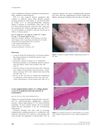 34 citations,
July 1999 in “Journal of The European Academy of Dermatology and Venereology”
34 citations,
July 1999 in “Journal of The European Academy of Dermatology and Venereology” Iron deficiency is not a significant cause of hair loss in women.
 33 citations,
November 2008 in “European Journal of Pharmaceutical Sciences”
33 citations,
November 2008 in “European Journal of Pharmaceutical Sciences” St. John's wort increases finasteride metabolism, reducing its effectiveness; use caution when combining them.
 33 citations,
August 2006 in “Journal der Deutschen Dermatologischen Gesellschaft”
33 citations,
August 2006 in “Journal der Deutschen Dermatologischen Gesellschaft” Pregnancy can cause specific skin conditions that need correct diagnosis and treatment to protect both mother and baby.
 31 citations,
October 2020 in “Journal of nanomaterials”
31 citations,
October 2020 in “Journal of nanomaterials” Silver nanoparticles made from Grewia optiva leaf extract show strong antibacterial, antioxidant, and hair growth benefits.
 31 citations,
July 2017 in “Clinical Science”
31 citations,
July 2017 in “Clinical Science” MicroRNAs are important for skin health and could be targets for new skin disorder treatments.
 30 citations,
July 2017 in “BioEssays”
30 citations,
July 2017 in “BioEssays” Activating NRF2 might help treat hair disorders by improving antioxidant defenses.
 27 citations,
April 2019 in “Journal of The American Academy of Dermatology”
27 citations,
April 2019 in “Journal of The American Academy of Dermatology” Where melanoma is on the body affects survival chances; melanomas on the back of the head are worse, while those on thighs and arms are less severe, and more sun exposure might improve survival.
 27 citations,
August 2006 in “Laboratory Investigation”
27 citations,
August 2006 in “Laboratory Investigation” SCF and ET-1 together significantly increase skin pigmentation and melanin production.
 26 citations,
June 2010 in “Acta Pharmaceutica”
26 citations,
June 2010 in “Acta Pharmaceutica” Methods accurately measure tamsulosin hydrochloride and finasteride in combined dosages.
 25 citations,
April 2015 in “Current problems in dermatology”
25 citations,
April 2015 in “Current problems in dermatology” Hair regrowth slows with age and can be affected by treatments that change enzyme activity in the skin.
 25 citations,
September 2014 in “Biological Research”
25 citations,
September 2014 in “Biological Research” Arctiin helps protect hair cells from damage and death caused by oxidative stress.
 24 citations,
September 2008 in “Clinical and experimental dermatology”
24 citations,
September 2008 in “Clinical and experimental dermatology” Repigmentation in vitiligo may come from melanocyte stem cells in the skin.
 23 citations,
September 2018 in “Dermatologic Therapy”
23 citations,
September 2018 in “Dermatologic Therapy” Microneedling is a safe and effective way to improve various skin conditions with minimal side effects.
 22 citations,
July 2017 in “BMC complementary and alternative medicine”
22 citations,
July 2017 in “BMC complementary and alternative medicine” Natural remedies for hair and scalp issues are still widely used in Palestine.
 22 citations,
July 2007 in “Spectrochimica Acta Part A: Molecular and Biomolecular Spectroscopy”
22 citations,
July 2007 in “Spectrochimica Acta Part A: Molecular and Biomolecular Spectroscopy” New method accurately measures finasteride in tablets.
 21 citations,
January 2019 in “Experimental dermatology”
21 citations,
January 2019 in “Experimental dermatology” Light therapy using helium-neon lasers can help restore skin color in vitiligo by promoting skin cell growth and movement.
 21 citations,
May 2008 in “Talanta”
21 citations,
May 2008 in “Talanta” New, cheaper method measures finasteride in tablets accurately and quickly.
 21 citations,
January 1995 in “Journal of the American Institute for Conservation”
21 citations,
January 1995 in “Journal of the American Institute for Conservation” A new method extracts red dyes from wool without damaging it, although it slightly weakens the wool.
 20 citations,
December 2003 in “Journal of Cosmetic and Laser Therapy”
20 citations,
December 2003 in “Journal of Cosmetic and Laser Therapy” An 800nm diode laser safely and effectively reduces hair for about 8 months, with most patients satisfied and few side effects.
![Synthesis of 5,6,6-[2H3]Finasteride and Quantitative Determination of Finasteride in Human Plasma at Picogram Level by an Isotope-Dilution Mass Spectrometric Method](/images/research/0026b639-99a8-455a-a986-c39aa65abfa9/small/2087.jpg) 20 citations,
December 1995 in “Journal of Chromatography B: Biomedical Sciences and Applications”
20 citations,
December 1995 in “Journal of Chromatography B: Biomedical Sciences and Applications” Accurate method measures finasteride levels in human plasma using gas chromatography-mass spectrometry.
 19 citations,
January 2007 in “Biological & pharmaceutical bulletin”
19 citations,
January 2007 in “Biological & pharmaceutical bulletin” Glycine reduces skin pigmentation by lowering melanin production.
 18 citations,
January 2018 in “International journal of medical sciences”
18 citations,
January 2018 in “International journal of medical sciences” Non-thermal plasma treatment makes mouse skin thicker and increases growth factors without harming the tissue.
 18 citations,
January 2016 in “Elsevier eBooks”
18 citations,
January 2016 in “Elsevier eBooks” Nanotechnology improves cosmetics' effectiveness and safety.
 18 citations,
August 2014 in “Lipids”
18 citations,
August 2014 in “Lipids” Human hair has more unsaturated fats inside than on the surface, and certain lipids may help bind the outer and inner layers together.
 18 citations,
July 2014 in “Molecular Medicine Reports”
18 citations,
July 2014 in “Molecular Medicine Reports” UVB radiation changes the levels of certain microRNAs in skin cells, which may affect cell survival and hair growth.
 18 citations,
January 2006 in “Analytical Sciences”
18 citations,
January 2006 in “Analytical Sciences” Method accurately measures minoxidil concentration in medicines.
 17 citations,
December 2019 in “Stem Cells International”
17 citations,
December 2019 in “Stem Cells International” Bioactive molecules show promise for improving skin repair and regeneration by overcoming current challenges with further research.
 17 citations,
December 2002 in “Biochemical and biophysical research communications”
17 citations,
December 2002 in “Biochemical and biophysical research communications” Scientists found out how a specific protein in human hair cuticles behaves and is structured.
 16 citations,
June 2019 in “Industrial Biotechnology”
16 citations,
June 2019 in “Industrial Biotechnology” Freezing brown seaweed right after harvesting and using microwave-assisted extraction with 75% 1,3-propanediol as a solvent is the best way to get polyphenols for cosmetics.
 16 citations,
December 2006 in “Expert Review of Dermatology”
16 citations,
December 2006 in “Expert Review of Dermatology” Hair follicles are essential for skin health, aiding in hair growth, wound healing, and immune function.




















![Synthesis of 5,6,6-[2H3]Finasteride and Quantitative Determination of Finasteride in Human Plasma at Picogram Level by an Isotope-Dilution Mass Spectrometric Method](/images/research/0026b639-99a8-455a-a986-c39aa65abfa9/small/2087.jpg)









